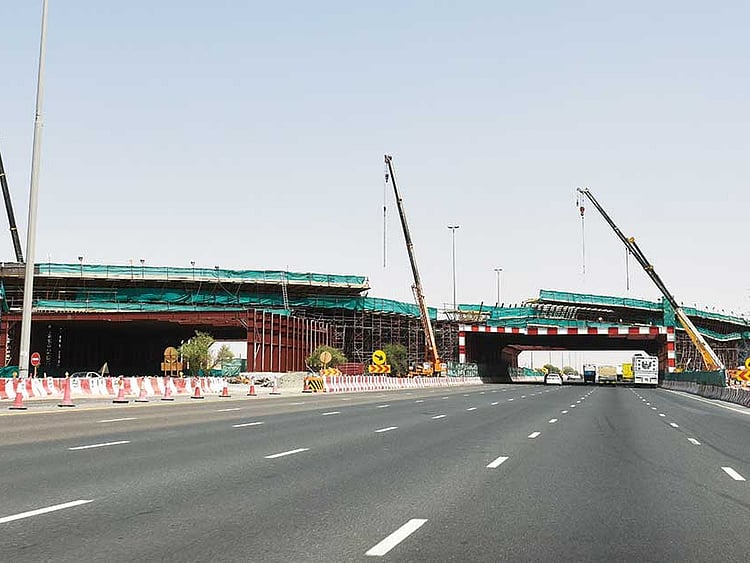Dubai: A new Dubai-Sharjah alternative route is currently taking shape, expected to bring a 30 per cent drop in traffic between the busy corridors connecting the two emirates.
Giving thousands of motorists driving between the two emirates daily something to cheer about, the alternative, a 12-kilometre link between Mohammad Bin Zayed Road and Emirates Road, will be particularly handy for motorists travelling to and from northern emirates and eastern suburbs of Sharjah.
Moving the traffic away from the perennially clogged Ittihad Road, Beirut Street and Mohammad Bin Zayed Road, the new project will help motorist gain a quicker access to Emirates Road via Mirdif along Tripoli Road.
Set to be ready early next year, the Dh500 million project will work as an extension of Al Khail Road heading all the way along Business Bay Crossing, Rabat Street and Tripoli Road, which is being extended to connect with the Emirates Road between the exits of E44 and D50.
Coming after the Dh200 million upgrade of Al Badi Interchange on Emirates Road that helped ease a major bottleneck towards Sharjah and northern emirates, the authorities feel the Tripoli Road extension will draw more traffic away from the clogged highways and help ease traffic on all the major arteries.
“The project aims to enhance the link between Dubai and Sharjah besides easing traffic congestions and stepping up safety along this corridor. Upon completion, this road will run parallel to Al Amardi — Al Khawaneej as well as Al Awir-Ras Al Khor corridors,” said Mattar Al Tayer, Director General and Chairman of the Board of Executive Directors of Roads and Transport Authority (RTA), when the project was launched last year.
The project will see a 5.3-kilometre extension of Tripoli road, which is also being widened from the Mirdif interchange on Mohammad Bin Zayed road to Emirates Road.
For thousands of motorists who regularly use Emirates Road for their daily commute, the new link will also reduce the daily mileage clocked by their cars, cutting short the trip distance compared to the current routes that they take to reach Emirates Road from Dubai.
Currently, motorists heading to Emirates Road have to take the long routes along Ras Al Khor/Hatta Road, Al Ain Road or the long-winding Airport-Al Amardhi road stretch.
“The upgrade includes widening of Tripoli Road over a 6.5-km stretch from the Mirdif City Centre interchange up to the Academic City road interchange. It also includes the construction of a new 5.3km road of three lanes in each direction from the intersection of the Academic City up to the Emirates Road, easing the traffic flow on the corridor by 30 per cent,” he added.
Consisting of an underpass and three flyovers, the upgrade will ensure non-stop movement of traffic at 12,000 vehicles per hour in both directions.
Among the upgrades is a six-lane underpass at the Tripoli-Algiers roads junction as well as redesigning the at-grade signalised intersection, which will reduce the waiting time at the junction from three minutes to less than one minute.
At the Tripoli-Nouakchott and Tripoli-Academic City roads junctions each, six-lane flyovers are being built, while another flyover connecting Tripoli road with Emirates road is currently taking shape.
Running parallel to the Dh490 million Airport Road Improvement Project, which opened for traffic in phases since last year, the two corridors being built at a combined cost of Dh1billion, is expected to bring a major difference in traffic movement around Dubai International Airport and its adjoining areas.
In numbers
• 30 per cent improvement expected in Dubai-Sharjah traffic
• 12km extension links Shaikh Mohammad Bin Zayed Road with Emirates Road
• Dh500 million project has four interchanges comprising a tunnel and three bridges
• 12,000 vehicles per hour in both directions
Sign up for the Daily Briefing
Get the latest news and updates straight to your inbox
Network Links
GN StoreDownload our app
© Al Nisr Publishing LLC 2026. All rights reserved.
